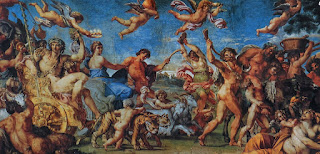Thieves, Prostitutes, and Sinners
In the Book of Matthew, chapter 21, verse 31, Jesus makes a declaration to the religious leaders of his day that tax collectors and prostitutes where entering the kingdom of heaven ahead of them. While few are big fans of the IRS, in those days, the Jewish people under Roman occupation viewed the tax collectors as traitorous thieves....and they were.
Clearly this was a huge slap to the religious leaders as they would have taken great exception to the idea that these seedy people could possibly dawn the gates of Heaven at all...let alone a head of them. So what was it that made these bottom dwelling outcasts so exceptional that they would ascend the ranks of Heaven’s social structure to be among the first to enter its gates?
There is a common theme that is often thrust upon us regarding the significance of obedience to God as being a major factor in who gets accepted into eternity’s most extravagant gated community. But if obedience to the rules was such a big deal, then it is odd that Jesus doesn’t spend more time talking about personal discipline and living more structured lives. Instead He often talks about servanthood, selflessness, and generosity.
There is an interesting theme through out the sacred Scriptures, one that is not so much linked to obedience but the pursuit of status. From the moment Adam and Eve reached for the forbidden fruit in an attempt to “be like God,” all the way down to the disciples themselves arguing who would be the greatest in Heaven, the Bible documents (quite repetitively) man’s struggle to accept his place in the universal hierarchy. From the beginning of time we’ve chased the elusive winds of the divine attempting to attain power, prestige, and everlasting youth. We have a genuine, “better than you” psychology that still exists today in our attempts to rise to the top of the social ladder as a politician, celebrity, person of great importance.
Even those who don’t wish to rise to the very top are often still lured by the opportunity to get into the VIP section of the restaurant or be presented special treatment. What’s terrifying is this dangerous mindset has even worked its way into the churches of today, where pastors will pass up opportunities for one-on-one interactions in favor of preparing for their weekly, or sometimes multiple times a week, addresses to the masses. This is where we stand up above the people on our stages and from our pulpits soak in the intoxicating experience of having the collective attention of a crowd.
Yet when we study Jesus we see Him giving few public sermons, as most of his teachings took place in small groups. On the occasions where He did speak to big crowds He almost immediately moves on, avoiding the opportunity to continue to bask in their adoration. He tells us to become servants, to become like little children, that the first shall be last and the last first. Jesus shuns status, taking on the roles of the most lowly servants as demonstrations to His followers of what Heaven values.
Is it possible that the reason thieves, prostitutes, and sinners are moved to the front of Heaven’s entrance line is because even with all of their failures, the one thing they don’t do is see themselves as better than anyone else? That while they learned to embrace their value to God as being made in His image, perhaps they were also humbled by their broken lives to the point that they could look upon another person and not see that person as below them? After all, isn’t that how servants are supposed to be? Isn’t that how children were supposed to be, especially in an era where they were to be seen and not heard? Perhaps in a world of people striving to elevate themselves above others through fame, power, and yes...even religion....perhaps Heaven is a place we fall to rather than rise to. Perhaps it is those willing to take the down escalator to the servant quarters in the basement, rather than seeking the penthouse suite, who actually find the home of God.



Comments
Post a Comment